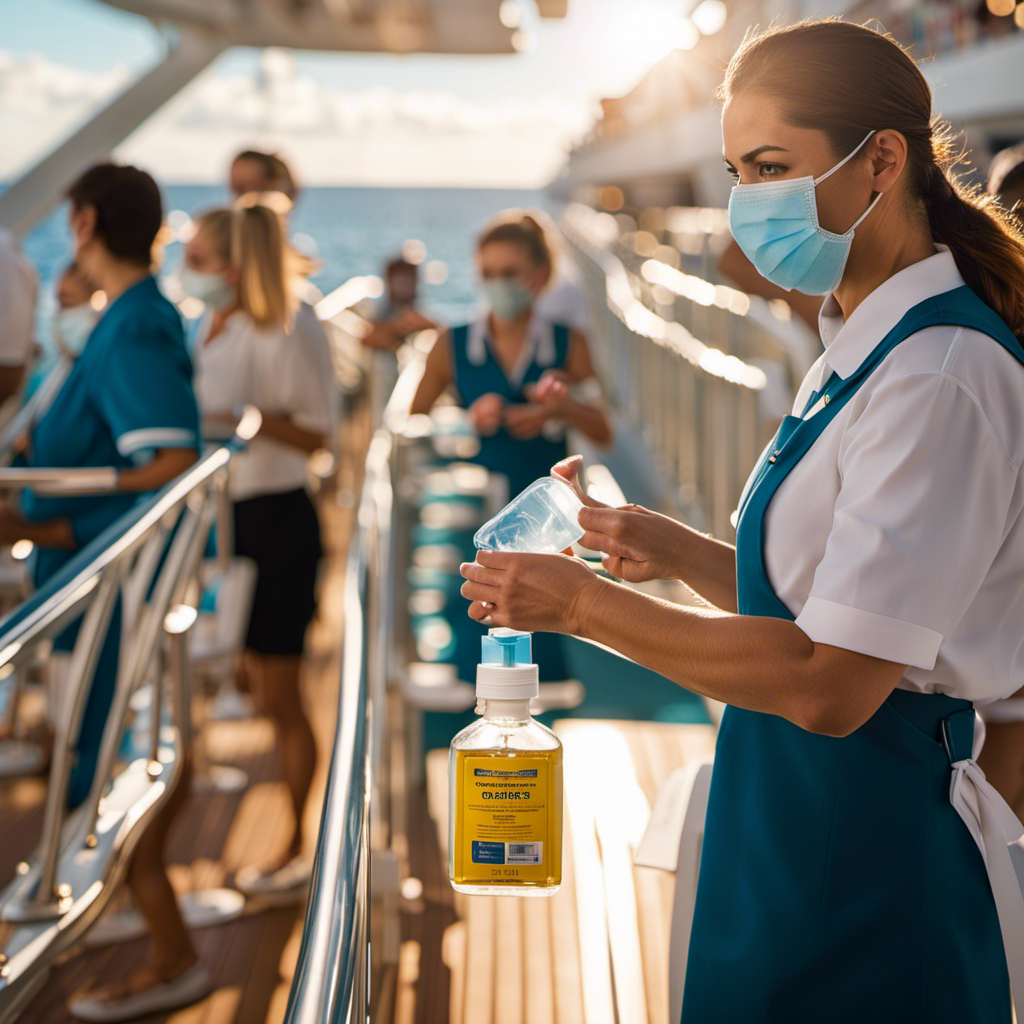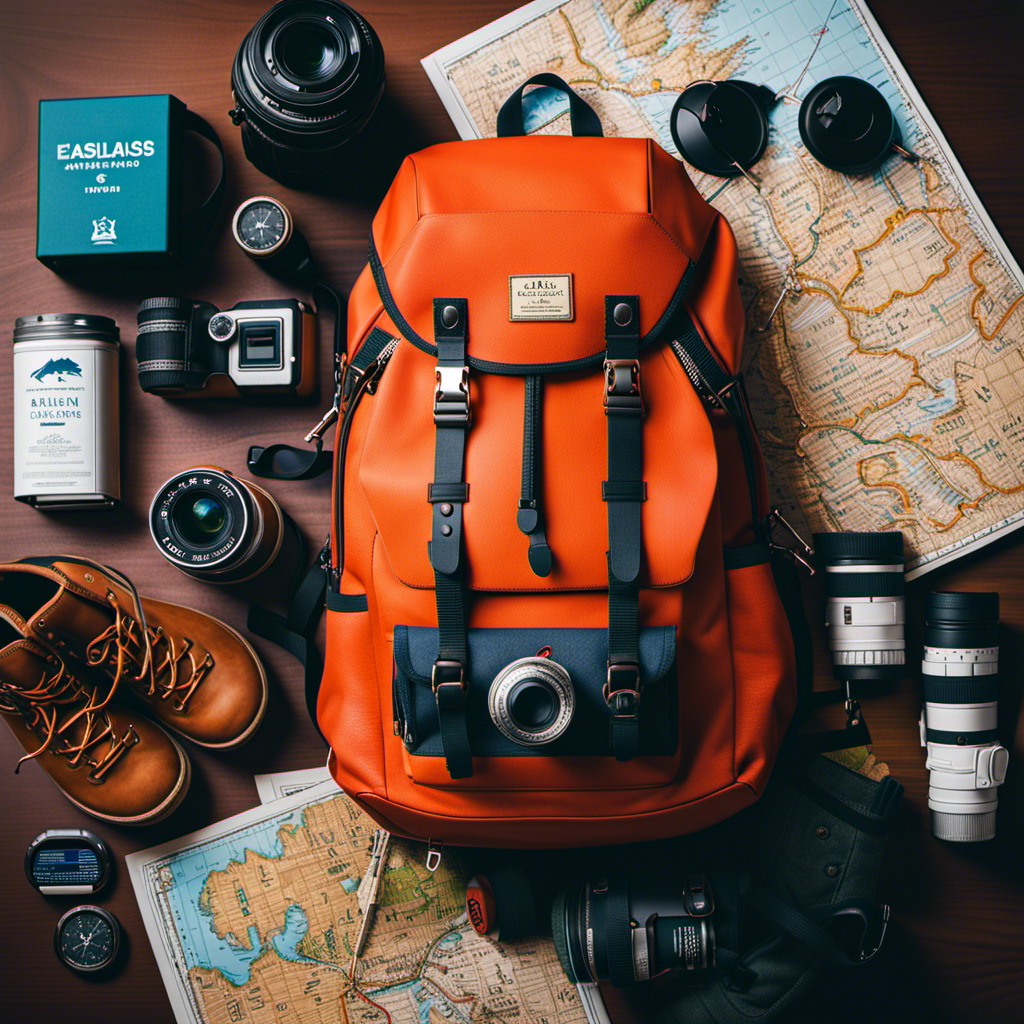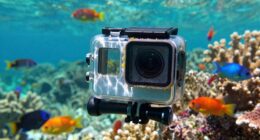Picture embarking on a cruise vacation, feeling the soft warmth of the ocean breeze against your skin as you step onto a Royal Caribbean ship.
But in the midst of the current pandemic, safety is of utmost importance. That’s why Royal Caribbean has implemented a comprehensive set of health measures to ensure the well-being of its passengers.
From temperature checks using no-touch thermometers to assessments by medical professionals, these measures are designed to prevent the spread of the coronavirus and prioritize the safety of everyone on board.
In this article, we will explore Royal Caribbean’s proactive approach to passenger safety and their efforts to mitigate the risk of infection.
Key Takeaways
- Royal Caribbean has implemented a series of health measures to prevent the spread of the Coronavirus, including temperature checks for all passengers.
- These health measures include the use of no-touch thermometers, secondary screenings for high temperatures, pulse oximetry readings, and assessment by medical professionals.
- Passengers with chronic lung illness must provide a letter from a medical practitioner indicating normal baseline oxygen saturation levels and undergo additional screening measures.
- In the event of denial of boarding due to health reasons, passengers will receive compensation, including a 100% future cruise credit and refunds for precruise purchases and taxes/fees.
Health Screening Measures
I will be subject to health screening measures when boarding a Royal Caribbean cruise to ensure the safety of all passengers. These measures include temperature checks and pulse oximetry readings. These assessment methods are crucial in detecting any potential health risks and preventing the spread of the Coronavirus.
Temperature checks are conducted using no-touch thermometers to accurately measure passengers’ body temperatures. In addition, pulse oximetry readings are taken to assess oxygen saturation levels. This comprehensive screening process allows medical professionals to identify individuals with high temperatures or flu-like symptoms, ensuring that appropriate actions can be taken.
The use of digital thermometers further enhances temperature accuracy, providing reliable results. These health measures are implemented in compliance with health guidelines and regulations, prioritizing the well-being and safety of everyone on board.
Implementation of Measures
To successfully implement the health measures, Royal Caribbean has taken into account the potential concerns of passengers and has ensured that the screening process is efficient and thorough.
The implementation of these measures began on March 6, 2020, with mandatory temperature checks on embarkation day. To ensure accuracy, digital thermometers are being used for temperature readings. Passengers with high temperatures undergo secondary screening, which includes an assessment of flu-like symptoms and respiratory illness by medical professionals.
While the effectiveness of temperature checks in detecting the spread of COVID-19 may have some limitations, it is an important measure in mitigating the risk of infection on Royal Caribbean ships.
The cruise line is committed to complying with health guidelines and regulations, prioritizing the well-being of everyone on board. Royal Caribbean recognizes the importance of these measures in preventing the spread of the virus and ensuring the safety of passengers and crew.
Requirements for Chronic Lung Illness
The requirements for passengers with chronic lung illness include providing a letter from a medical practitioner indicating normal baseline oxygen saturation levels. This is to ensure that passengers with chronic lung illness are fit to sail and can safely enjoy their cruise experience.
In addition to the letter, these passengers are subject to additional screening measures to further assess their health condition. Medical professionals on board conduct a thorough assessment to determine their fitness to sail. This assessment includes evaluating their overall health, respiratory function, and any flu-like symptoms they may be experiencing.
If deemed necessary, passengers with chronic lung illness may be denied boarding to prioritize their safety and prevent any potential risks. Royal Caribbean takes these measures seriously to ensure the well-being of all passengers and comply with health guidelines and regulations.
Consequences of Denial of Boarding
By denying boarding to passengers with chronic lung illness, Royal Caribbean not only protects their physical health, but also provides them with a valuable opportunity to prioritize their own well-being. This decision is made after a thorough assessment by medical professionals to ensure the fitness to sail.
Although it may be disappointing for these passengers, Royal Caribbean offers compensation in the form of a 100% Future Cruise Credit for the cruise fare paid. Additionally, any precruise Royal Caribbean International purchases will be refunded, as well as taxes and fees to the original form of payment. This financial compensation provides assurance of protection for passengers and acknowledges the inconvenience caused.
By offering these measures, Royal Caribbean demonstrates their commitment to passenger safety and the overall well-being of everyone on board.
Importance of Health Measures
Implementing these health protocols on board the ship is crucial for the well-being of everyone involved.
Royal Caribbean’s commitment to preventing infection and ensuring the well-being of passengers and crew is evident in their comprehensive health measures. By conducting temperature checks, using no-touch thermometers, and performing secondary screenings for high temperatures, they are able to identify potential cases of illness.
Additionally, the pulse oximetry readings and assessments by medical professionals further enhance their ability to detect any signs of flu-like symptoms or respiratory illness.
By requiring passengers with chronic lung illness to provide a letter from a medical practitioner, Royal Caribbean ensures that those with underlying health conditions receive additional screening and assessment.
Denial of boarding, if necessary, is a difficult decision but one that prioritizes the safety of all passengers. Royal Caribbean’s commitment to financial protection and compensation for denied boarding due to health reasons demonstrates their dedication to passenger safety.
As I step on board the ship, I feel a sense of relief knowing that my well-being and the well-being of my fellow passengers and crew are being prioritized through comprehensive health protocols.
Royal Caribbean’s health measures are crucial in ensuring cruise ship safety and preventing the spread of COVID-19. These measures include mandatory temperature checks using no-touch thermometers on embarkation day. Secondary screening is conducted for passengers with high temperatures, and pulse oximetry readings are taken to assess oxygen saturation levels.
Medical professionals are available to assess any flu-like symptoms or respiratory illness. For passengers with chronic lung illness, additional screening measures are implemented, including a letter from a medical practitioner indicating normal baseline oxygen saturation levels. If deemed necessary, passengers may be denied boarding, but they are provided with 100% Future Cruise Credit and refunds for their purchases.
These health measures are essential in mitigating the risk of infection and ensuring the safety of everyone on board.
Now let’s discuss how Royal Caribbean is enhancing passenger well-being by implementing safety protocols.
The cruise line is committed to ensuring the safety of all passengers and crew members amidst the ongoing COVID-19 pandemic. To achieve this, Royal Caribbean has implemented a range of health measures.
These protocols include mandatory temperature checks using no-touch thermometers on embarkation day, as well as secondary screenings for passengers with high temperatures. Additionally, pulse oximetry readings and assessments by medical professionals are conducted to further ensure the health of passengers.
For those with chronic lung illness, additional screening measures and assessments are in place before boarding is allowed. These measures are crucial in mitigating the risk of infection and complying with health guidelines and regulations.
Royal Caribbean prioritizes the well-being of everyone on board and is dedicated to creating a safe and healthy environment for all passengers.
I appreciate the commitment to creating a safe and healthy environment for all passengers on board Royal Caribbean ships.
The implementation of temperature checks and pulse oximetry readings is crucial in ensuring the prevention of the spread of Coronavirus COVID-19. By conducting temperature checks on embarkation day using no-touch thermometers and digital thermometers for accuracy, Royal Caribbean can quickly identify passengers with high temperatures.
In addition, the assessment of pulse oximetry readings allows for a thorough examination of passengers’ oxygen saturation levels. These health measures are essential in mitigating the risk of infection and complying with health guidelines and regulations.
By prioritizing the well-being of everyone on board, Royal Caribbean is taking proactive steps to ensure the safety of both passengers and crew.
Frequently Asked Questions
What specific guidelines and regulations is Royal Caribbean following to ensure passenger safety in regards to preventing the spread of coronavirus?
To ensure passenger safety and prevent transmission of COVID-19, Royal Caribbean follows specific guidelines and regulations. These include temperature checks, no-touch thermometers, secondary screenings, pulse oximetry readings, and assessments by medical professionals. Safety protocols prioritize the well-being of passengers and mitigate infection risks.
Are there any additional health screening measures being implemented for crew members on Royal Caribbean ships?
Yes, additional health screening measures are being implemented for crew members on Royal Caribbean ships. These measures include temperature checks, pulse oximetry readings, and assessments by medical professionals to ensure the safety of everyone on board.
How often will passengers’ temperatures be checked throughout the duration of the cruise?
Passenger monitoring includes regular temperature screening throughout the cruise. The frequency of temperature checks is not specified in the given information.
What kind of compensation can passengers expect if they are denied boarding due to health reasons?
Passengers who are denied boarding due to health reasons can expect compensation options, including a 100% Future Cruise Credit for cruise fare paid, refund of pre-cruise purchases, refund of taxes and fees, and assurance of financial protection. Passengers’ rights are prioritized.
Will Royal Caribbean be providing any additional resources or support for passengers with chronic lung illness during their cruise?
Passengers with chronic lung illness will receive additional support and resources during their cruise. Royal Caribbean offers specialized cruise accommodations and passenger support to ensure their well-being and enjoyment throughout the trip.









